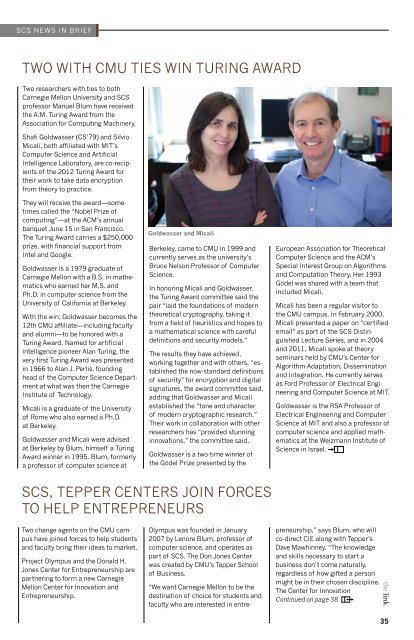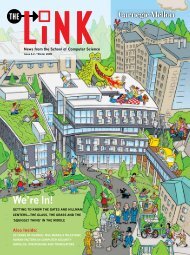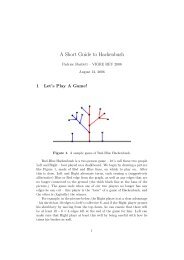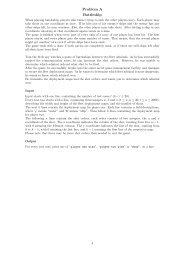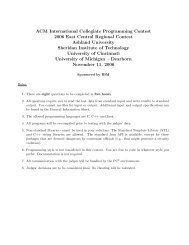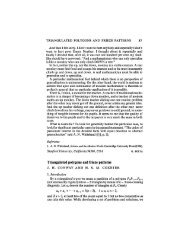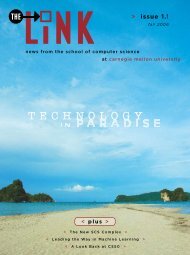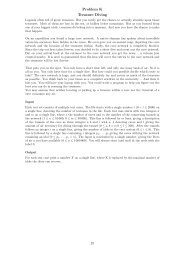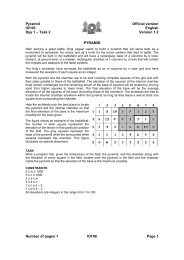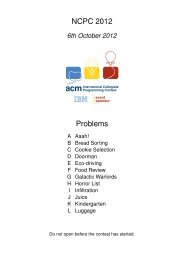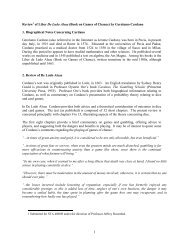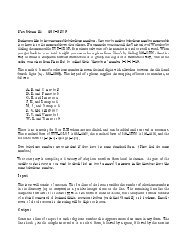Download now (1.3MB, PDF reader required) - Link home page
Download now (1.3MB, PDF reader required) - Link home page
Download now (1.3MB, PDF reader required) - Link home page
Create successful ePaper yourself
Turn your PDF publications into a flip-book with our unique Google optimized e-Paper software.
SCS NEWS IN BRIEF<br />
TWO WITH CMU TIES WIN TURING AWARD<br />
Two researchers with ties to both<br />
Carnegie Mellon University and SCS<br />
professor Manuel Blum have received<br />
the A.M. Turing Award from the<br />
Association for Computing Machinery.<br />
Shafi Goldwasser (CS’79) and Silvio<br />
Micali, both affiliated with MIT’s<br />
Computer Science and Artificial<br />
Intelligence Laboratory, are co-recipients<br />
of the 2012 Turing Award for<br />
their work to take data encryption<br />
from theory to practice.<br />
They will receive the award—sometimes<br />
called the “Nobel Prize of<br />
computing”—at the ACM’s annual<br />
banquet June 15 in San Francisco.<br />
The Turing Award carries a $250,000<br />
prize, with financial support from<br />
Intel and Google.<br />
Goldwasser is a 1979 graduate of<br />
Carnegie Mellon with a B.S. in mathematics<br />
who earned her M.S. and<br />
Ph.D. in computer science from the<br />
University of California at Berkeley.<br />
With the win, Goldwasser becomes the<br />
12th CMU affiliate—including faculty<br />
and alumni—to be honored with a<br />
Turing Award. Named for artificial<br />
intelligence pioneer Alan Turing, the<br />
very first Turing Award was presented<br />
in 1966 to Alan J. Perlis, founding<br />
head of the Computer Science Department<br />
at what was then the Carnegie<br />
Institute of Technology.<br />
Micali is a graduate of the University<br />
of Rome who also earned a Ph.D.<br />
at Berkeley.<br />
Goldwasser and Micali were advised<br />
at Berkeley by Blum, himself a Turing<br />
Award winner in 1995. Blum, formerly<br />
a professor of computer science at<br />
goldwasser and micali<br />
Berkeley, came to CMU in 1999 and<br />
currently serves as the university’s<br />
Bruce Nelson Professor of Computer<br />
Science.<br />
In honoring Micali and Goldwasser,<br />
the Turing Award committee said the<br />
pair “laid the foundations of modern<br />
theoretical cryptography, taking it<br />
from a field of heuristics and hopes to<br />
a mathematical science with careful<br />
definitions and security models.”<br />
The results they have achieved,<br />
working together and with others, “established<br />
the <strong>now</strong>-standard definitions<br />
of security” for encryption and digital<br />
signatures, the award committee said,<br />
adding that Goldwasser and Micali<br />
established the “tone and character<br />
of modern cryptographic research.”<br />
Their work in collaboration with other<br />
researchers has “provided stunning<br />
innovations,” the committee said.<br />
Goldwasser is a two-time winner of<br />
the Gödel Prize presented by the<br />
European Association for Theoretical<br />
Computer Science and the ACM’s<br />
Special Interest Group on Algorithms<br />
and Computation Theory. Her 1993<br />
Gödel was shared with a team that<br />
included Micali.<br />
Micali has been a regular visitor to<br />
the CMU campus. In February 2000,<br />
Micali presented a paper on “certified<br />
email” as part of the SCS Distinguished<br />
Lecture Series, and in 2004<br />
and 2011, Micali spoke at theory<br />
seminars held by CMU’s Center for<br />
Algorithm Adaptation, Dissemination<br />
and Integration. He currently serves<br />
as Ford Professor of Electrical Engineering<br />
and Computer Science at MIT.<br />
Goldwasser is the RSA Professor of<br />
Electrical Engineering and Computer<br />
Science at MIT and also a professor of<br />
computer science and applied mathematics<br />
at the Weizmann Institute of<br />
Science in Israel.<br />
SCS, TEPPER CENTERS JOIN FORCES<br />
TO HELP ENTREPRENEURS<br />
Two change agents on the CMU campus<br />
have joined forces to help students<br />
and faculty bring their ideas to market.<br />
Project Olympus and the Donald H.<br />
Jones Center for Entrepreneurship are<br />
partnering to form a new Carnegie<br />
Mellon Center for Innovation and<br />
Entrepreneurship.<br />
Olympus was founded in January<br />
2007 by Lenore Blum, professor of<br />
computer science, and operates as<br />
part of SCS. The Don Jones Center<br />
was created by CMU’s Tepper School<br />
of Business.<br />
“We want Carnegie Mellon to be the<br />
destination of choice for students and<br />
faculty who are interested in entrepreneurship,”<br />
says Blum, who will<br />
co-direct CIE along with Tepper’s<br />
Dave Mawhinney. “The k<strong>now</strong>ledge<br />
and skills necessary to start a<br />
business don’t come naturally,<br />
regardless of how gifted a person<br />
might be in their chosen discipline.<br />
The Center for Innovation<br />
Continued on <strong>page</strong> 38<br />
the link.<br />
35


